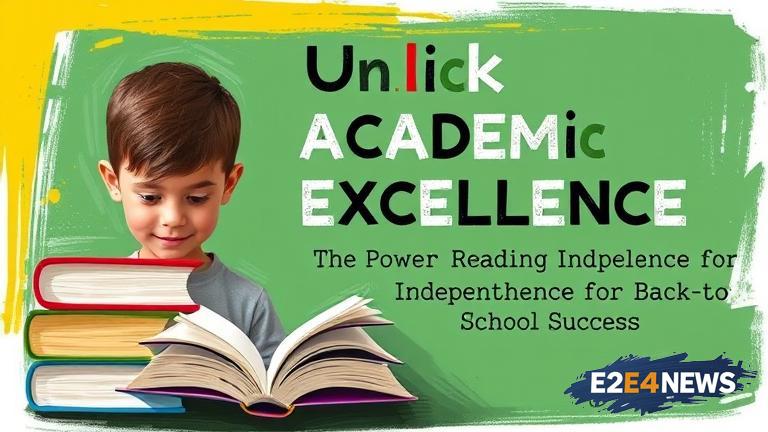As the new school year approaches, parents and educators are gearing up to help students achieve academic success. One crucial factor that can make all the difference is reading independence. Reading independence refers to a student’s ability to read and comprehend texts on their own, without relying on others for support. This skill is essential for academic success, as it enables students to complete assignments, participate in class discussions, and develop a deeper understanding of various subjects. When students possess reading independence, they are more likely to excel in school and develop a lifelong love for learning. On the other hand, struggling readers may fall behind their peers, leading to frustration and decreased motivation. To foster reading independence, parents and educators can start by creating a supportive learning environment that encourages students to read regularly. This can be achieved by setting aside dedicated time for reading, providing access to a wide range of texts, and offering guidance and feedback. Additionally, teachers can use various strategies to promote reading independence in the classroom, such as leveled reading, reading workshops, and literature circles. By doing so, students will develop the skills and confidence needed to tackle complex texts and become independent readers. Moreover, reading independence is closely linked to other essential skills, such as critical thinking, problem-solving, and communication. When students can read and comprehend texts independently, they are better equipped to analyze information, evaluate evidence, and express their thoughts and ideas effectively. This, in turn, can lead to improved academic performance, increased confidence, and a stronger sense of self-efficacy. Furthermore, reading independence can have a positive impact on students’ social and emotional well-being. When students can read and understand texts on their own, they are more likely to feel a sense of accomplishment and pride in their abilities, leading to increased motivation and engagement. In contrast, struggling readers may experience anxiety, frustration, and decreased self-esteem. To address this issue, parents and educators can work together to identify areas where students need extra support and provide targeted interventions to help them catch up. By prioritizing reading independence and providing the necessary support, we can empower students to succeed in school and beyond. In fact, research has shown that reading independence is a strong predictor of academic success, with students who possess this skill tend to perform better in reading comprehension, vocabulary, and overall academic achievement. Moreover, reading independence can have long-term benefits, such as improved career prospects, increased earning potential, and a greater sense of personal fulfillment. As the back-to-school season approaches, it is essential for parents and educators to recognize the importance of reading independence and take proactive steps to foster this skill. By doing so, we can set students up for success, help them develop a lifelong love for learning, and empower them to reach their full potential. In conclusion, reading independence is a critical factor in ensuring academic success, and it is essential for parents and educators to work together to promote this skill. By providing a supportive learning environment, using effective teaching strategies, and offering targeted support, we can help students develop the reading independence they need to succeed in school and beyond. With the right approach, we can unlock the full potential of our students and empower them to achieve academic excellence.





